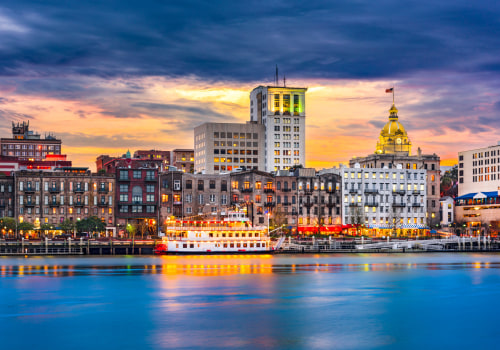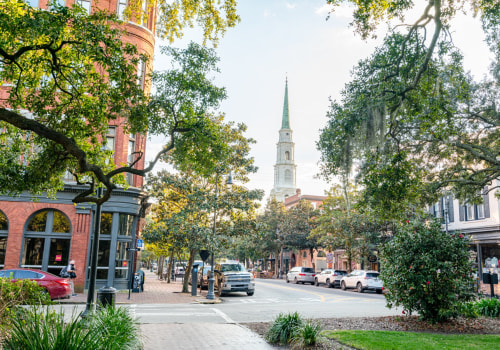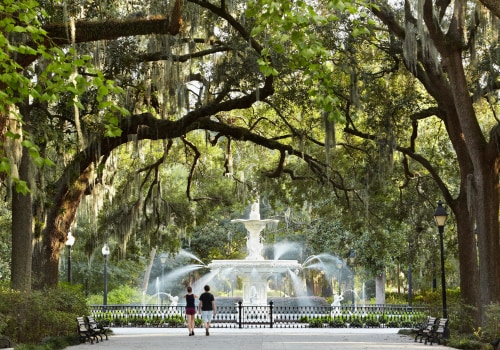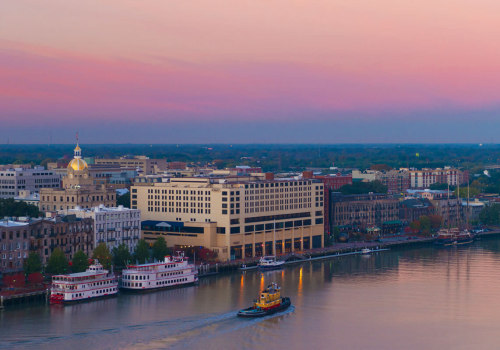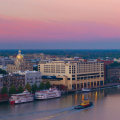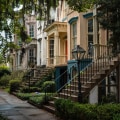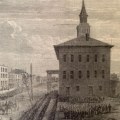As the oldest city in the state of Georgia, Savannah has a long and colorful history filled with interesting characters and beautiful places. From manicured parks and horse-drawn carriages to ornate pre-war architecture, it's no wonder that Savannah is one of the most visited cities in the South. On February 12, 1733, General James Oglethorpe and settlers from the ship Anne landed at Yamacraw Bluff and were greeted by Tomochichi, the Yamacraws, and Indian traders John and Mary Musgrove. Mary Musgrove often served as an interpreter.
The city of Savannah was founded on that date, along with the colony of Georgia. In 1751, Savannah and the rest of Georgia became a royal colony and Savannah became the colonial capital of Georgia. Savannah, a thriving seaport throughout the 19th century, was the sixth most populated city in the Confederacy and the main objective of General William T. Early on December 21, 1864, local authorities negotiated a peaceful surrender to save Savannah from destruction, and the troops of The Union entered the city at dawn.
For years, Savannah was home to Union Camp, which housed the world's largest paper mill. The plant is now owned by International Paper and remains one of Savannah's major employers. Savannah is also home to Gulfstream Aerospace, a manufacturer of private aircraft, as well as other large industrial companies. Morris Multimedia, a newspaper and television company, is also based in Savannah.
Beyond its architectural importance as the largest historically restored urban area in the country, the city of Savannah has a rich and growing performing arts scene, offering cultural events throughout the year. The Savannah International Trade and Convention Center is located on Hutchinson Island, in front of downtown Savannah and surrounded by the Savannah River. The Belles Ferry connects the island to the mainland, as does the Talmadge Memorial Bridge. The Savannah Civic Center, on Montgomery Street, is home to more than nine hundred events every year.
Savannah has numerous historic places of worship. Founded in 1733, with the establishment of the colony of Georgia, Christ Church (Episcopal) is the largest continuous Christian congregation in Georgia. Among its first rectors were Methodist evangelists John Wesley and George Whitefield. Located on the original site in Johnson Square, Christ Church continues to be an active congregation.
The Independent Presbyterian Church, founded in 1755, is located near Chippewa Square. The church's current sanctuary (the third) dates from the early 1890s. Among the opulent buildings that succumbed to the fires were the mansions of Bonaventure Plantation and Greenwich Plantation. Colonial Park Cemetery was the city's main cemetery for much of the 18th century., when Georgia was a British colony.
Laurel Grove Cemetery, with the graves of many Confederate soldiers and African-American slaves, was the main municipal cemetery in Savannah during the 19th century. Bonaventure Cemetery is a former plantation and the final resting place of some illustrious Savannahs. Savannah is also home to the Mordecai Sheftall Cemetery and the Levi Sheftall Family Cemetery, which date back to the second half of the 18th century. Some parts of the East Coast Greenway, a 5,000-kilometer (3,000 mile) long trail system from Maine to Florida, they cross Savannah.
Savannah is also home to most of the schools in the Chatham County school district, the Savannah-Chatham County Public Schools. Among the most prominent high schools in Savannah-Chatham County are the following. Public schools are indicated with an asterisk. Amtrak operates a passenger terminal in Savannah for its Palmetto and Silver Service trains, which run between New York City York and Miami.
Two southbound and three northbound trains make daily stops at the Savannah terminal. The Port of Savannah, manufacturing industry, military and tourism have become Savannah's four main economic engines in the 21st century. Savannah's main television stations are WSAV-TV, channel 3 (NBC); WTOC-TV, channel 11 (CBS); WJCL, channel 22 (ABC); and WTGS, channel 28 (Fox). Established in 1733 on the Savannah River, the city of Savannah became the British colonial capital of the province of Georgia and, later, the first state capital of Georgia.
Winters in Savannah are mild and sunny, with average daily highs of 61.4°F (16°C) in January. Savannah is an ancient city known throughout the country for its beautiful coastal landscapes, well-preserved architecture, and rich and vibrant history. In 1820, this disease decimated a tenth of Savannah's population and nine more epidemics occurred, one in 1876 that killed 1,066 Savannahs. Savannah's modern municipal market area is home to some of the best bars, wine tasting rooms, art galleries and boutiques in the city.
During the 1996 Summer Olympics organized in Atlanta, Savannah held sailing competitions in nearby Wassaw Sound. Savannah's architecture, history, and reputation for Southern charm and hospitality are known internationally. Located east of Savannah, on a swampy island, it has a 2-mile (3.2 km) nature trail for native animals that meanders through maritime forests, salt marshes and freshwater wetlands. British troops took the city in 1778, and the following year, a combined force of American and French soldiers, including Haitians, failed to defeat the British at the siege of Savannah. One of the best fun facts about Savannah is that the American Prohibition Museum, located in the City Market area, is the only museum of its kind.
